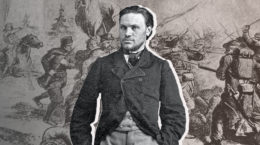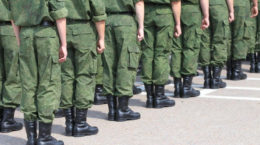The Belarusian army can be called a place of confinement: they are imprisoned here for a year and a half, deprived of all means of communication, faced with propaganda, torture, prohibitions and rare visits with their families. Soldiers in Belarus are as much victims as prisoners. And accidents in the army are carefully concealed. But those that do come out are horrifying.
In Belarus, every young man from 18 to 27 years old must do military service in the Belarusian army – if he has no medical contraindications or official deferment. Guys must serve for a year (with higher education) or a year and a half (without higher education). Conscription is realized twice a year, in spring and in autumn. Every year about 10 thousand young men are conscripted into the military service in Belarus. And practically every year news about suicides, attempted suicides, and accidents of the lads come out of the units.
On 13 April 2005, three months after he was drafted into the army, Maksim Kozheko died in the military town of Pechy in Barysau. Before committing suicide, Maksim Kozheko left his unit on his own and was found the next day 6 kilometres away in the forest. The soldier hanged himself on his own belt. A farewell note was found in his pocket, asking him to “forgive all”.
In June 2006, a soldier Aleksander Shamrin died in a military unit in Pechy. According to the official version, the young man was whitewashing the ceiling and painting walls in one of the buildings of the military unit. He inadvertently fell from a height of over 2.5 metres and was in a coma for 11 days, after which he died. Forensic examination showed that the soldier suffered multiple fractures of the ribs, skull, jaw and a concussion. This makes it impossible to say definitively that they were sustained as a result of a single fall.
On May 4, 2007, Pavel Kozik was killed in a military unit in Vitebsk. His parents were told that the cause of death was acute coronary heart disease. A year and a half later Pavel Kozik’s comrades-in-arms demobilized, they decided to tell the whole truth: on the fateful day the soldier was hit in the solar plexus by another soldier. Kozik fell to his knees and showed no signs of life: he was not breathing, there was no sign of cardiac activity, his blood pressure was absent, his pupils did not react to light, he had no pulse and excreted faeces. The soldier who hit Pavel was found guilty and sentenced to six months of house arrest.
On December 18, 2008, Anton Dolgalev, a 19-year-old private from Rahachou, was killed at the military firing range near Rechitsa. He was serving in Gomel military unit 5525 in the militia forces, patrolling the district centre. He had a month before demobilization. According to the official version, the soldier stumbled when changing a firing position and accidentally shot himself in the head, but Anton’s parents did not believe this version.
On April 8, 2009, a soldier Valery Shkut died in a military unit near Zaslavl. The initial and main version, which was voiced by his mother, was that Valeriy went out to smoke in the gazebo, he felt ill and died. An examination of the boy’s body revealed traces of haematomas. A criminal case was initiated under the article “Manslaughter by negligence”. A year later the case went to trial. Ten soldiers were convicted of hazing and Valeriy’s murder. No one from the leadership was tried.
On August 26, 2012, a soldier of the 103rd Airborne Division, 22-year-old Yevgeni Rudak, who had served in the army for only three months, was found hanged in Vitebsk. The main version is that he committed suicide in the toilet. Shortly before the tragedy, Yevgeni spoke to a friend on the phone and said he had been beaten by four men and asked him to come soon, otherwise he would be killed. Psychologists concluded that the boy was withdrawn and suicidal. The Investigative Committee became involved and a criminal case was opened for inciting suicide. Soldiers and sergeants were convicted.
On April 11, 2013, a 20-year-old soldier, Maksim Karachun, died during a grenade launcher shooting in military unit 04147. He had served four months at the time and it was the first time he had been at a firing range. The ruling to initiate criminal proceedings said that the weapon that killed Maksim was originally defective and should not have been allowed to be used for firing. The accused in the case was Senior Lieutenant Aleksandr Volkov, who at the time of the tragedy was listed as acting commander of the grenade launcher platoon in Uruchcha. Volkov was found guilty and sentenced to two years and six months in a penal colony in settlements.
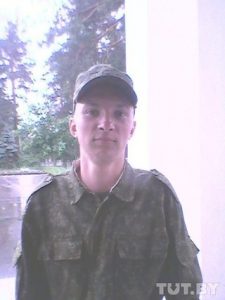
Vladislav Yahodkin
On September 1, 2013, 18-year-old Vladislav Yahodkin died in Pechy. The boy had served only three months; according to the official version, the cause of sudden death was coronary heart disease. Vladislav’s parents say that their son had been complaining, especially of high blood pressure in recent days. “For a couple of months, Vlad had been in the service, and they brought me my son’s body – in a coffin in rubber slippers. It was obvious that he was dying in agony. His teeth were much clenched, evidently because of the pressure, capillaries on his forehead – never seen before, his lip was black, vessels in his right eye got broken,” Ludmila Yagodkina, the soldier’s mother, says. She is also surprised that her son was allowed into the troops in such a state of health. “Before the army, he was hospitalized, receiving treatment for his kidney pressure. He has had problems with blood pressure since school, although he was not registered as hypertensive”. According to his mother, his son did not complain of any beatings in the army. But from the soldier’s accounts, Vlad was taken up at night, forced to run in a gas mask, and put a huge strain on his heart.
On March 21, 2015, a 22-year-old conscript Mikhail Bevzyuk died in Barysau. He was found hanged in the territory of the military unit. His family believes he may have been driven to his death. Two days before his death, Mikhail called his brother, asking him to come and see him next weekend.
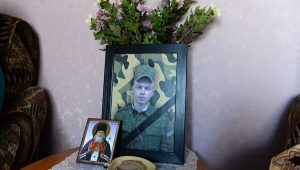
Sergey Murugov
On August 4, 2016, Sergey Murugov, a 23-year-old soldier, died in a military division in Pechy. The unit said he shot himself on the firing range during an exercise and described the incident as a suicide. His relatives think that their son was driven to it. During his service Sergey became anxious, calling in tears. Also, he often asked for money, and the sums were not insignificant, and they noticed bruises on his son’s body when he came home on his day off. A criminal case was not initiated due to a lack of corpus delicti.
In October 2016, Andrey Manonin killed himself in Lida military unit. Before his death, Andrey had served five months in the army. In the evening, his comrades-in-arms found Andrey in a noose in the barracks toilet. The Investigative Committee opened a criminal case for inciting suicide. The investigation was suspended and resumed, but the case was dropped. Relatives of the dead soldier are sure that hazing was the cause of the boy’s death. But their main argument is the suicide note where Andrey blames specific people for what happened. Soon after Andrey Manonin’s death, his mother began receiving threatening phone calls demanding that she not tell journalists anything.
On February 10, 2017, the body of 19-year-old Pavel Starenkov, who had served in Barysau, was found in the forest. In November 2016, he had left his unit and had been missing for three months. The main cause of death was suicide. An investigation got conducted, his fellow servicemen and relatives got interviewed. The results of the verification are not known.

Aleksander Statuev
On February 18, 2017, Aleksander Statuev, an enlisted soldier, died in Pechy. During the morning wake-up and the formation of personnel, the soldier fell down and lost consciousness. The doctor pronounced him dead after resuscitation efforts. The cause of death was acute insufficiency due to ischemic heart disease in combination with small focal serous myocarditis. All details have been carefully withheld from the family.
On March 31, 2017, Artem Bastyuk died in the army. The 25-year-old software engineer was serving in a military unit in Barysau. The day before his death, Bastyuk called his parents, apologised and said goodbye. The worried relatives immediately contacted the management of the unit and asked them to look into the situation. They were assured that their son would be all right. Three weeks before his death, his parents came to the unit to meet its management. Then Artem Bastyuk, in the presence of his parents, told the command about hazing and named those who put pressure on him. After Bastiuk’s death, the Investigative Committee launched an investigation. The case was closed six months later without punishing anyone.
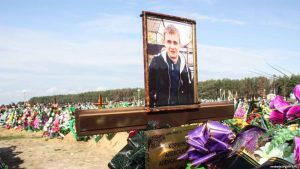
Aleksander Korzhych
On October 4, 2017, news broke in the Belarusian media about the death of a conscript soldier in the 3rd tank training company in the military town of Pechy in Barysau. Aleksander Korzhych, 21, was found hanged from his trouser belt in the basement of the medical unit. Korzhych’s relatives refused to believe the official version of suicide and handed over to the media photos of Aleksander, which clearly show bruises. They also say that Aleksander Korzhych was repeatedly robbed of his money while serving in the army and threatened with reprisals. In the summer of 2017, Aleksander began asking his mother to transfer money to his bank card, which the warrant officer took possession of. On September 17, he was admitted to a medical unit for treatment for an acute respiratory infection, and on September 26, he was discharged and disappeared. On April 19, 2018, it was announced that the Investigating Committee had completed its investigation. After considering the versions of suicide, incitement to suicide and premeditated murder, the investigation concluded that the NCOs of the unit where Korzhych was serving had led him to commit suicide. Three sergeants were found guilty of the boy’s death and sentenced to six, seven and nine years in prison. But Aleksander Korzhych’s mother remained unhappy with the verdict.

Dmitri Udod
On April 4, 2018, 20-year-old Dmitri Udod died – he was shot dead by a tank gun during a firearms training session due to compromised security measures. The tragedy took place in the 120th separate mechanised brigade in Uruchcha. Dmitri Udod was a witness in the case of Aleksander Korzhych. Before the army, he graduated from a vocational school in Mozyr and became a plasterer and painter. Dmitri managed to work on a collective farm, at a meat processing plant and even travelled to Russia several times to earn money.
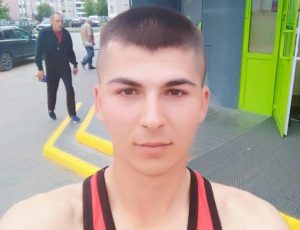
Aleksander Orlov
On September 5, 2018, Aleksander Orlov, an enlisted soldier, died in Slonim. Before his death, the lad had called his mother several times, discussing with her what he would do when he got home. The family was gathering documents to have the lad discharged. Aleksander’s mother said that her son kept asking for money but would not tell her why he needed it. The woman suspected that her son faced hazing and asked him directly about it. Aleksandr replied: “I can’t say anything. They listen to us.” During the first months in the army, the boy complained of psychological pressure. When they went to Minsk for two weeks to prepare for the parade, Aleksander called from there and complained that it was even worse here than in Slonim. He hinted that he was being beaten. On September 5, Aleksander had a long talk with his mother, and in the evening, he was found hanged in the storage room for the street cleaning equipment. The boy had two rope marks on his neck, one of them from strangulation. Aleksander’s mother suggested that he had been strangled first and then hanged. “When we picked him up from the morgue, we saw a bruise on his right elbow and the top of his right palm. He must have fought back with his hand. At the morgue, they refused to show us my son’s back. We were in shock, I was led out of there under my arms, and we did not think to be more insistent,” the woman recalled. The Investigative Committee of Belarus refused to initiate criminal proceedings into the death of the serviceman. The investigators came to the conclusion that Aleksander hanged himself, unable to endure the hardships of service. The boy’s mother has still not received answers to her questions: how her son got two ligature marks on his neck, why his body was injured before he died, how he got into an enclosed room and why committed suicide if he had no suicidal thoughts.
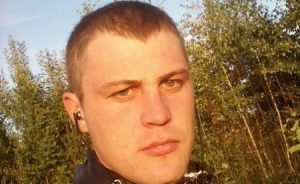
Sergey Yasyukevich
On September 8, 2018, the body of 26-year-old enlisted soldier Sergey Yasyukevich from the Slonim garrison was found in a forest near Grodno. He had a suicide note with him. There were two months left till the end of the service. According to relatives, Sergey repeatedly asked to transfer money to his card. The military reported that the reason for the suicide was not related to the service.
On June 2, 2019, 20-year-old Fedor Bunas, serving in the army under contract, committed suicide in Grodno. The serviceman drank a large dose of medication and went outside, where he became ill. He was called an ambulance, but medics couldn’t save the guy. The media learnt that the guy had argued with his girlfriend the day before. The cause of death was listed as a medically induced stroke. A month before his death, Fedor had been convicted of hazing. The serviceman in the Grodno garrison was characterised positively, performed his duties conscientiously, and the young man had plans to become an ensign.
On June 12, 2019, soldier Dmitri Hantsevich died suddenly in a military unit in Baranovichi. His fellow soldiers found Dmitri in a locker room in an unconscious state. An inspection allegedly revealed that on June 11, all soldiers in / hr No 7404 were sent to the square at 2 p.m., where they were forced to exercise for two hours in +30 temperatures.
On July 13, 2019, an enlisted soldier Andrey Molis tried to commit suicide in the 11th Mechanised Brigade in Slonim. He had been conscripted in November 2018. The guy cut his veins on both hands. The soldier got rescued.
On July 23, 2019, Andrey Shcherbakov, a private in the reconnaissance battalion of the 6th separate Guards mechanised brigade based in Grodno, slit his wrists. This soldier served for two months and could not endure “hazing”. The guy was saved. The soldier who cut his veins got sentenced to 7 years in prison under Article 447 of the Criminal Code of Belarus (evasion of military service by self-mutilation or other means).

Ruslan Zaitsev
On November 20, 2019, 19-year-old Ruslan Zaitsev was found dead in the Mozyr border guard unit. The Border Committee voiced the version that the soldier committed suicide by shooting himself. But his relatives do not believe it, suggesting that Ruslan was shot through negligence. Ruslan’s comrade-in-arms suddenly disappeared. The military unit said that he had been transferred to another division. The Investigative Committee refused the exhumation.
On June 8, 2020, Sergey Voloshin, a 20-year-old serviceman in an anti-aircraft missile brigade, died of a gunshot injury. He had served in the army for just over six months. On the evening of that day, the lad had locked himself in the gun room and fired a shot. Before the accident, his behaviour and mood did not seem suspicious to his friends – the guy was behaving as usual, following the news, watching streamers and listening to music. Sergey did not want to serve in the army, but he could not avoid it. Sergey studied at a chemical engineering college, specialising in the technology of woodworking, then worked in a factory. He was socially withdrawn but had many online friends with whom he shared hobbies. Sergey realised that he could not perform all tasks well and was inferior to other soldiers in some respects. The trial in the case began in February 2021. The defendant in the case was a 24-year-old contract serviceman, the chief of calculation of the receiving and transmitting units of a radio technical battery, who failed to monitor the safety of weapons and the performance of daily duty.
On January 15, 2021, a soldier from the Pinsk frontier guard unit attempted suicide with a firearm while on duty. The 20-year-old had been doing military service in the border guard detachment since May 2020. His characterisation in the service was positive. On the day of the incident, he was on patrol to check his documents for entry into the border guard. Fortunately, the suicide attempt was unsuccessful, and the soldier was saved.
On January 25, 2021, a new suicide in the Belarusian army became known. An enlisted soldier shot himself in Smorgon. The guy was 18 years old and was serving in a unit that provided security for the BelNPP. The soldier was on guard between the power units of the nuclear plant and shot himself in the neck with a service weapon.
On February 19, 2022, there was an accident in a unit of Hrodna garrison: a 19-year-old soldier, conscript, was injured. According to the press service of the Ministry of Defense, it happened “as a result of violations of the rules of arms handling in a military unit of Hrodna garrison. The next day the young man died in hospital.
Being the warrior of the Belarusian army is no longer pride but fear to die as a result of an accident, inaction of the leadership, a wrong diagnosis or hazing. That is why Belarusian lads do not aspire to do their duty to the motherland but go to universities and leave the country. Now soldiers face another danger – to die in a foreign land as a result of military action unleashed by a dictator and return home in a zinc coffin. But we hope that thanks to the “NO means NO” campaign, we will be able to prevent our boys from dying in Ukraine.





